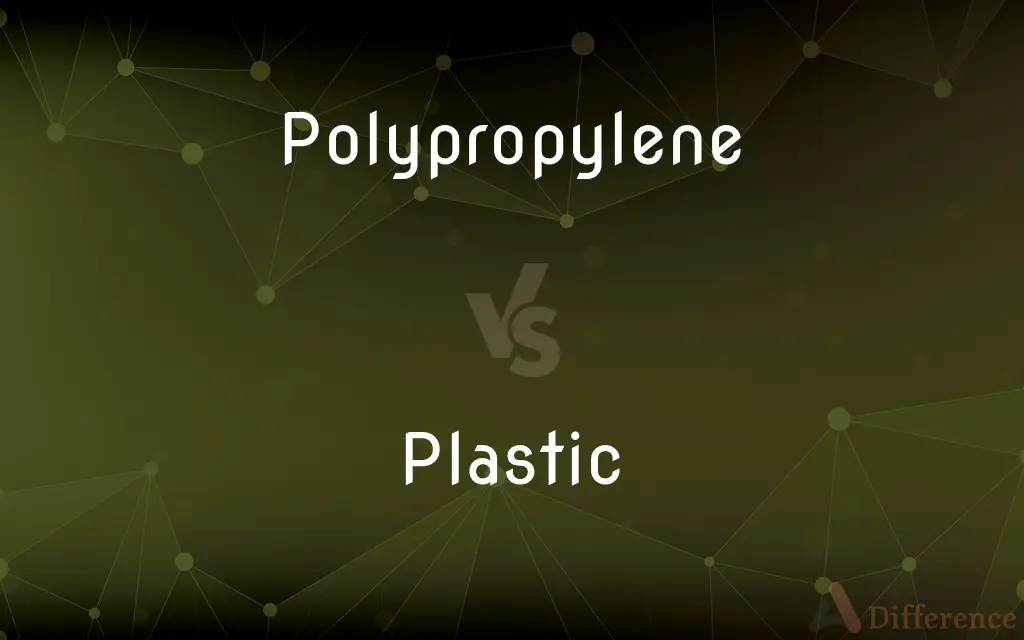Polypropylene vs. Plastic — What's the Difference?
Edited by Tayyaba Rehman — By Fiza Rafique — Updated on October 1, 2023
Polypropylene is a specific type of plastic polymer, while "plastic" is a general term for a wide range of synthetic or semi-synthetic materials.

Difference Between Polypropylene and Plastic
Table of Contents
ADVERTISEMENT
Key Differences
Polypropylene and plastic are terms that often intersect in the world of materials. Polypropylene is a specific type of polymer, known for its versatility and resistance to many chemical solvents, bases, and acids. On the other hand, plastic is a broad term that refers to a range of synthetic or semi-synthetic materials that can be molded into different shapes and products.
While polypropylene is itself a plastic, not all plastics are polypropylene. There are many different types of plastics, including polyethylene, polystyrene, and PVC, to name a few. Each plastic has its own unique properties and applications, with polypropylene being just one of them.
Polypropylene is often used in packaging, textiles, automotive parts, and more due to its robust characteristics and durability. Plastic, in its broader sense, encompasses a vast array of products from everyday items like bottles and containers to specialized medical devices or computer components.
When discussing environmental concerns, both polypropylene and plastic raise issues regarding disposal and biodegradability. Polypropylene, like many other plastics, can take hundreds of years to decompose, contributing to the broader environmental challenges posed by plastic waste.
Comparison Chart
Definition
A specific type of polymer.
A broad term for synthetic or semi-synthetic materials.
ADVERTISEMENT
Varieties
One specific kind of plastic.
Includes many types, such as polyethylene, PVC, polystyrene, etc.
Common Uses
Often found in packaging, textiles, and automotive parts.
Used in countless products, from bottles to electronic components.
Chemical Resistance
Resistant to many solvents, bases, and acids.
Resistance varies by type; some plastics may not offer the same resistance.
Environmental Consideration
Takes hundreds of years to decompose.
Many plastics are non-biodegradable and pose environmental challenges.
Compare with Definitions
Polypropylene
A polymer resistant to many chemicals.
Polypropylene containers are excellent for storing cleaning agents.
Plastic
Non-biodegradable and persists in the environment.
Plastic waste poses a significant threat to marine life.
Polypropylene
A type of plastic often used in textiles.
The carpet is made from woven polypropylene fibers.
Plastic
A synthetic or semi-synthetic material.
The toy was made of colorful plastic.
Polypropylene
Commonly used in packaging.
The snack bag is crafted from clear polypropylene.
Plastic
Can be molded into various shapes and forms.
The artist used plastic to create a unique sculpture.
Polypropylene
Known for its durability and versatility.
Polypropylene is a preferred choice for outdoor furniture.
Plastic
A general term for a wide range of polymers.
Different types of plastic have varied melting points.
Polypropylene
A recyclable plastic polymer.
Ensure to place polypropylene items in the appropriate recycling bin.
Plastic
Plastics are a wide range of synthetic or semi-synthetic materials that use polymers as a main ingredient. Their plasticity makes it possible for plastics to be moulded, extruded or pressed into solid objects of various shapes.
Polypropylene
Polypropylene (PP), also known as polypropene, is a thermoplastic polymer used in a wide variety of applications. It is produced via chain-growth polymerization from the monomer propylene.
Plastic
A synthetic material made from a wide range of organic polymers such as polyethylene, PVC, nylon, etc., that can be moulded into shape while soft, and then set into a rigid or slightly elastic form
Mains pipes should be made of plastic or copper
Bottles can be made from a variety of plastics
Polypropylene
A synthetic resin which is a polymer of propylene, used chiefly for films, fibres, or moulding materials
High-impact polypropylene
Polypropylene underwear
Plastic
Made of plastic
Plastic bottles
Polypropylene
Any of various thermoplastic polymers of propylene. They are hard and tough, and are used to make molded articles and fibers.
Plastic
(of a substance or material) easily shaped or moulded
Rendering the material more plastic
Polypropylene
A fabric of fibers made from any of these polymers.
Plastic
Capable of being shaped or formed
Plastic material such as clay.
Polypropylene
A thermoplastic resin made by the polymerization of propylene, and used for films, fibres, or moulding materials. Also known as polypropene.
Plastic
Relating to or dealing with shaping or modeling
The plastic art of sculpture.
Polypropylene
A polymer of propylene used as a thermoplastic molding material
Plastic
Having the qualities of sculpture; well-formed
"the astonishing plastic beauty of the chorus girls" (Frank Harris).
Plastic
Giving form or shape to a substance
The plastic forces that create and wear down a mountain range.
Plastic
Easily influenced; impressionable
"The plastic mind of the bank clerk had been ... distorted by what he had read" (Rudyard Kipling).
Plastic
Made of a plastic or plastics
A plastic garden hose.
Plastic
(Physics) Capable of undergoing continuous deformation without rupture or relaxation.
Plastic
Capable of building tissue; formative.
Plastic
Able to change and adapt, especially by acquiring alternative pathways for sensory perception or motor skills. Used of the central nervous system.
Plastic
Marked by artificiality or superficiality
A plastic world of fad, hype, and sensation.
Plastic
(Informal) Of or obtained by means of credit cards
Plastic money.
Plastic
Any of various organic compounds produced by polymerization, capable of being molded, extruded, cast into various shapes and films, or drawn into filaments used as textile fibers.
Plastic
(Informal) A credit card or credit cards
Would accept cash or plastic in payment.
Plastic
A synthetic, solid, hydrocarbon-based polymer, whether thermoplastic or thermosetting.
Plastic
Credit or debit cards used in place of cash to buy goods and services.
Plastic
Insincerity; fakeness, or a person who is fake or arrogant, or believes that they are better than the rest of the population.
Plastic
An instance of plastic surgery.
Plastic
(obsolete) A sculptor, moulder.
Plastic
(archaic) Any solid but malleable substance.
Plastic
Capable of being moulded; malleable, flexible, pliant.
Plastic
Producing tissue.
Plastic
(dated) Creative, formative.
Plastic
(biology) Capable of adapting to varying conditions; characterized by environmental adaptability.
Plastic
Of or pertaining to the inelastic, non-brittle, deformation of a material.
Plastic
Made of plastic.
Plastic
Inferior or not the real thing.
Plastic
Fake; insincere.
Plastic
Having the power to give form or fashion to a mass of matter; as, the plastic hand of the Creator.
See plastic Nature working to his end.
Plastic
Capable of being molded, formed, or modeled, as clay or plaster; - used also figuratively; as, the plastic mind of a child.
Plastic
Pertaining or appropriate to, or characteristic of, molding or modeling; produced by, or appearing as if produced by, molding or modeling; - said of sculpture and the kindred arts, in distinction from painting and the graphic arts.
Medallions . . . fraught with the plastic beauty and grace of the palmy days of Italian art.
Plastic
A substance composed predominantly of a synthetic organic high polymer capable of being cast or molded; many varieties of plastic are used to produce articles of commerce (after 1900). [MW10 gives origin of word as 1905]
Plastic
Generic name for certain synthetic or semisynthetic materials that can be molded or extruded into objects or films or filaments or used for making e.g. coatings and adhesives
Plastic
Used of the imagination;
Material...transformed by the plastic power of the imagination
Plastic
Capable of being molded or modeled (especially of earth or clay or other soft material);
Plastic substances such as wax or clay
Plastic
Capable of being influenced or formed;
The plastic minds of children
A pliant nature
Plastic
Often derived from petrochemicals.
The production of plastic has significant environmental implications.
Common Curiosities
Is polypropylene a kind of plastic?
Yes, polypropylene is a specific type of plastic polymer.
How long does it take for polypropylene to decompose?
Polypropylene, like many plastics, can take hundreds of years to decompose.
How many types of plastics exist?
There are numerous types of plastics, each with unique properties and uses, including polyethylene, PVC, polystyrene, and more.
What are common uses for polypropylene?
Polypropylene is used in packaging, textiles, automotive parts, and more.
Are plastics harmful to the environment?
Many plastics are non-biodegradable and can persist in the environment, causing harm to wildlife and ecosystems.
Why is polypropylene preferred in some applications?
Due to its resistance to chemicals and durability, polypropylene is preferred for many specific applications.
Are all plastics similar to polypropylene?
No, plastics vary in properties and composition, with polypropylene being just one type.
Is plastic derived from natural resources?
Most plastics are derived from petrochemicals, though some bioplastics come from renewable resources.
Can polypropylene be recycled?
Yes, polypropylene is recyclable and often has a recycling code "5."
Are there alternatives to traditional plastic?
Yes, there are bioplastics and other alternative materials, though they may have different properties.
Is "plastic" always synthetic?
Plastic generally refers to synthetic or semi-synthetic materials, though some bioplastics are derived from renewable sources.
How can I tell if a product is made of polypropylene?
Products made of polypropylene often have a recycling code "5" or may be labeled as "PP."
What's a major environmental concern with polypropylene?
Polypropylene, being a plastic, contributes to the issues of plastic waste persistence in the environment.
Can both polypropylene and general plastics be harmful if ingested?
Ingesting plastics or microplastics can be harmful to humans and animals due to potential toxins or physical blockages.
Why is plastic used so widely?
Plastic's versatility, malleability, and often low cost make it a preferred material for numerous applications.
Share Your Discovery

Previous Comparison
Brandy vs. Cognac
Next Comparison
Flywheel vs. GovernorAuthor Spotlight
Written by
Fiza RafiqueFiza Rafique is a skilled content writer at AskDifference.com, where she meticulously refines and enhances written pieces. Drawing from her vast editorial expertise, Fiza ensures clarity, accuracy, and precision in every article. Passionate about language, she continually seeks to elevate the quality of content for readers worldwide.
Edited by
Tayyaba RehmanTayyaba Rehman is a distinguished writer, currently serving as a primary contributor to askdifference.com. As a researcher in semantics and etymology, Tayyaba's passion for the complexity of languages and their distinctions has found a perfect home on the platform. Tayyaba delves into the intricacies of language, distinguishing between commonly confused words and phrases, thereby providing clarity for readers worldwide.















































